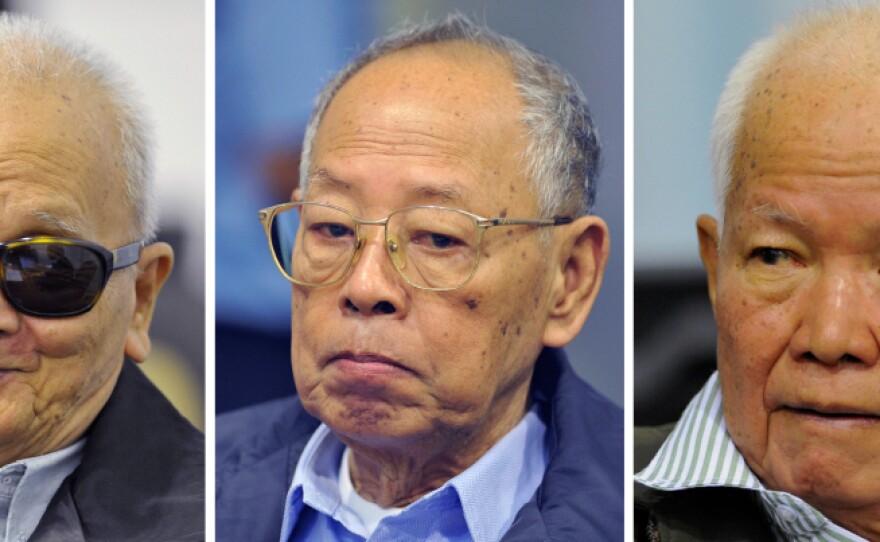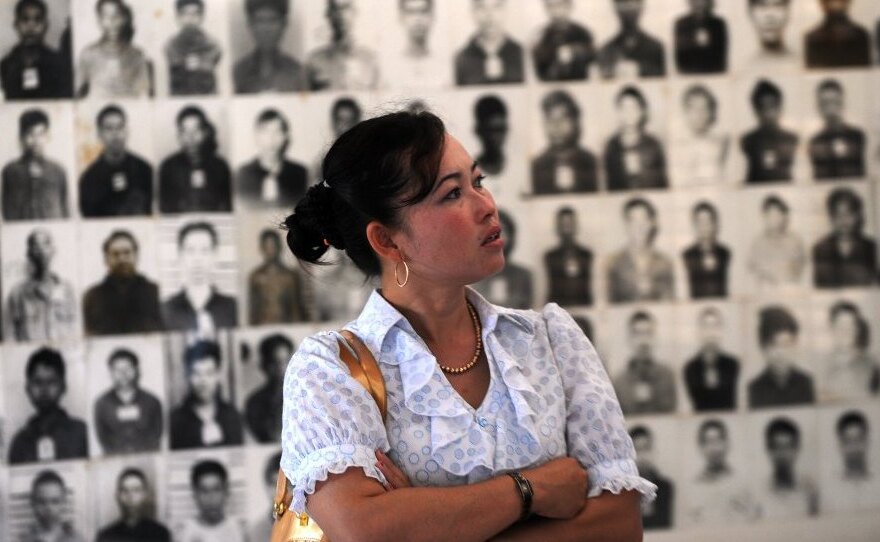In Cambodia this week, three elderly men are sitting in a courtroom, accused of atrocities that took place in the 1970s.
The three former leaders of the radical Khmer Rouge are on trial for their role in a regime that exterminated more than 2 million people — or roughly a quarter of the country's population.
The Khmer Rouge was forced from power more than three decades ago, its former leaders are growing old, and this may be the final trial held by the U.N.-backed tribunal.
Dressed in a black barrister's gown and speaking through a translator, co-prosecutor Chea Leng summed up the case to the tribunal's five foreign and Cambodian judges.

"The evidence we will put before you will show that the Communist Party of Kampuchea turned Cambodia into a massive slave camp, reducing an entire nation to prisoners living under a system of brutality that defies belief," she said.
The regime's chief ideologue, Nuon Chea, the head of state, Khieu Samphan, and its foreign minister, Ieng Sary, listened mutely to the proceedings. Their trials have been divided into segments in hopes of reaching some verdict before they die off.
The three, all in their 80s, have maintained their innocence.
Accounts Of Mass Killings
But Chea Leng linked the trio to policies that resulted in the deaths of up to 2.2 million people. She cited a witness account of when the Khmer Rouge forced the evacuation of the capital Phnom Penh in April 1975.
"Along the road, I saw the bodies of people who had died. They were already shriveled up, and people had walked on top of them. Some of them had been eaten by dogs. Death was everywhere," Chea Leng quoted the witness as saying.
Several thousand victims of the Khmer Rouge are preparing to file civil suits against their former oppressors and will seek symbolic reparations. They come from around the country and around the world.
Among them is former schoolteacher Sophany Bay, who now lives in San Jose, Calif. She says her three children were starved and beaten to death by the Khmer Rouge.
"I want to hear from the three top leaders, because they denied [their role]; they never apologized to the people," she said. "I want to know who was involved in these crimes."
I want to hear from the three top leaders, because they denied [their role]; they never apologized to the people. I want to know who was involved in these crimes.
Despite the millions of Cambodians who suffered under Khmer Rouge rule, surprisingly few are participating in the tribunal. Some claim they're being unfairly excluded from the proceedings.
But it's not just the victims who complain of injustice.
Nuon Chea's Dutch lawyer, Michiel Pestman, has filed a criminal complaint, accusing Prime Minister Hun Sen and other officials of interfering in the tribunal's proceedings.
"This government has prevented important witnesses from testifying in my case," Pestman said. "I think that is a crime, and something should be done about that. But my client knows he's going to be convicted and sentenced, whatever the evidence there is against him."
Some victims say the ideal reparations for them would be some kind of memorial, or something to help people remember this horrific chapter, even as they seek to put it behind them.
The Venerable Khy Sovanratana, abbot of Phnom Penh's Mongkulvan Buddhist temple, says he helps many Cambodians to face their traumatic memories in order to overcome them.
"We try to console them that this kind of thing can happen in our life, or in previous life," he said. "We should try to get rid of those suffering, those obsessions, then try to move on."
He is confident there will be justice for Cambodia — if not criminal justice, then at least karmic justice.
Copyright 2022 NPR. To see more, visit https://www.npr.org. 9(MDAzMjM2NDYzMDEyMzc1Njk5NjAxNzY3OQ001))







